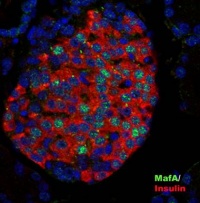Our Research
 The β-cells of the pancreatic islets are solely responsible for the production and secretion of insulin, a peptide hormone that is a fundamental regulator of glucose homeostasis. The loss of β-cell function results in the development of diabetes mellitus, a disease that represents a significant health problem in the United States and, increasingly, throughout the world.
The β-cells of the pancreatic islets are solely responsible for the production and secretion of insulin, a peptide hormone that is a fundamental regulator of glucose homeostasis. The loss of β-cell function results in the development of diabetes mellitus, a disease that represents a significant health problem in the United States and, increasingly, throughout the world.
The Stein Lab research program focuses on the role of transcription factors in β-cell development, function, and disease. Our research bridges the areas of biochemistry, tissue culture research, and animal models. A few of the transcription factors actively studied in our lab are Pdx1, MafA, and MafB. Pdx1 has a broad expression pattern, and is responsible for pancreas formation. MafB and MafA have a much more restricted expression pattern. During development in the mouse, MafB is present in both insulin+ and glucagon+ cells. However, after birth, MafB expression becomes restricted to glucagon+ cells. Meanwhile, MafA is expressed during the secondary transition, when the islet greatly expands its B-cell population. MafA is ONLY expressed in insulin+ cells, and remains there throughout adulthood in the mouse.
Our research seeks to address two main questions: Which transcription factors are responsible for β-cell development, and what is the mechanism of their action? We use biochemical assays such as protein purification, Electrophoretic Mobility Shift Assay (EMSA), Immunoprecipitation (IP), in vitro kinase assays, and Chromatin Immunoprecipitation (ChIP) to characterize and identify these transcription factors. We also study the effects of the absence of these transcription factors, or mutated forms of them, using the human β-cell lines EndoCβH1 and EndoCβH2 and the mouse β-cell lines βTC-3, Min6, and INS-1. In addition, we frequently use mice to study the in vivo roles of these transcription factors, as well as their roles in disease states.